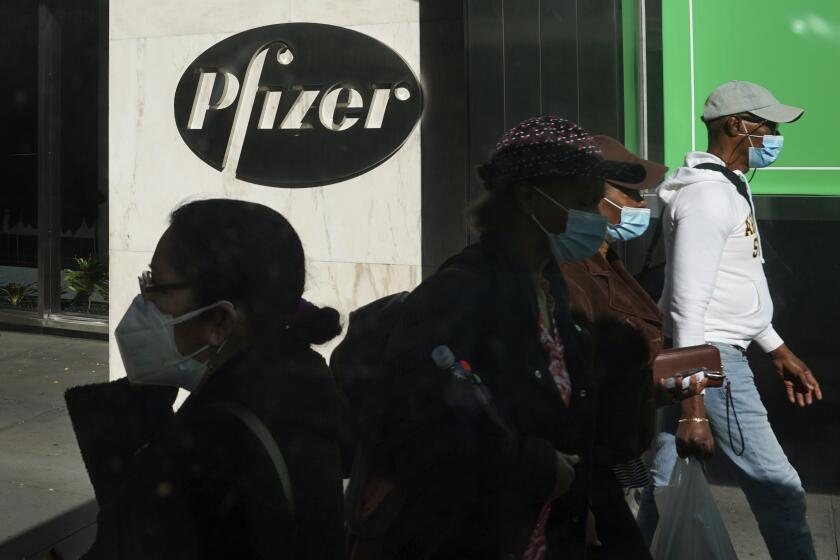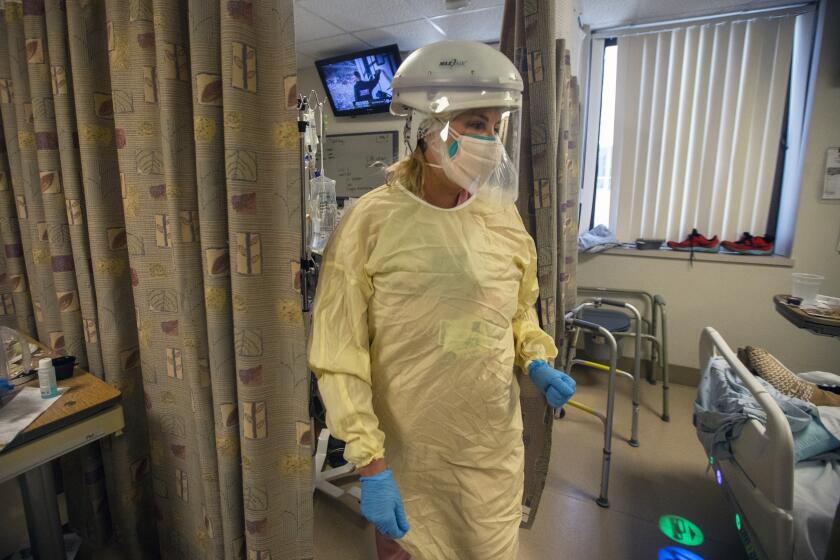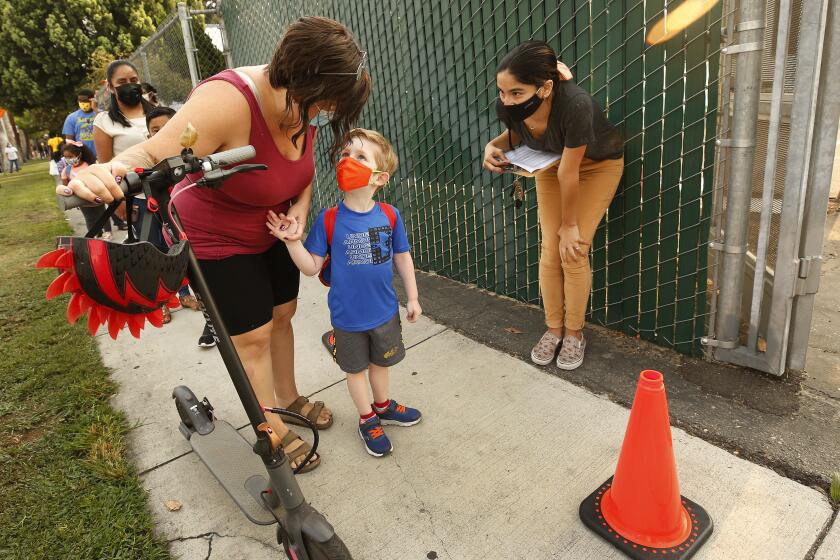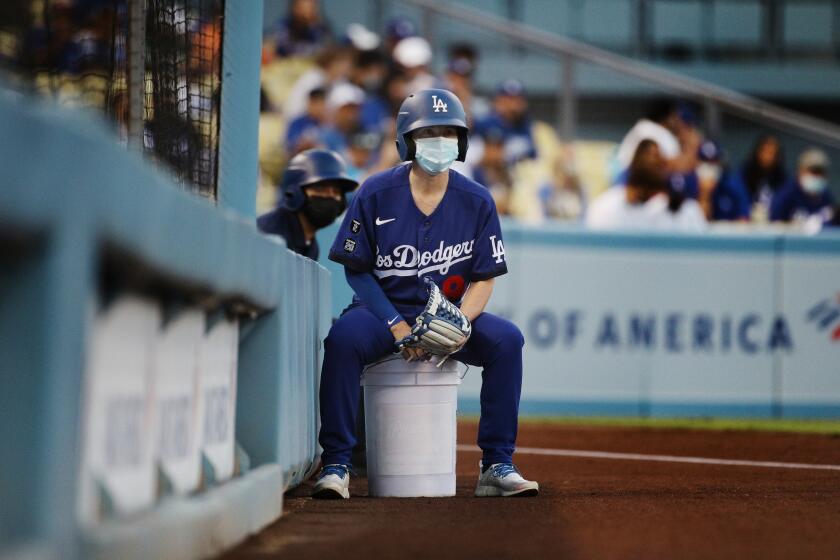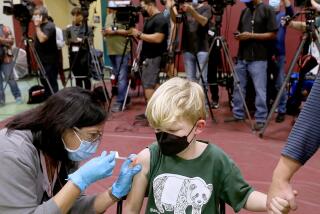Landmark FDA approval could turbocharge COVID-19 vaccinations in California
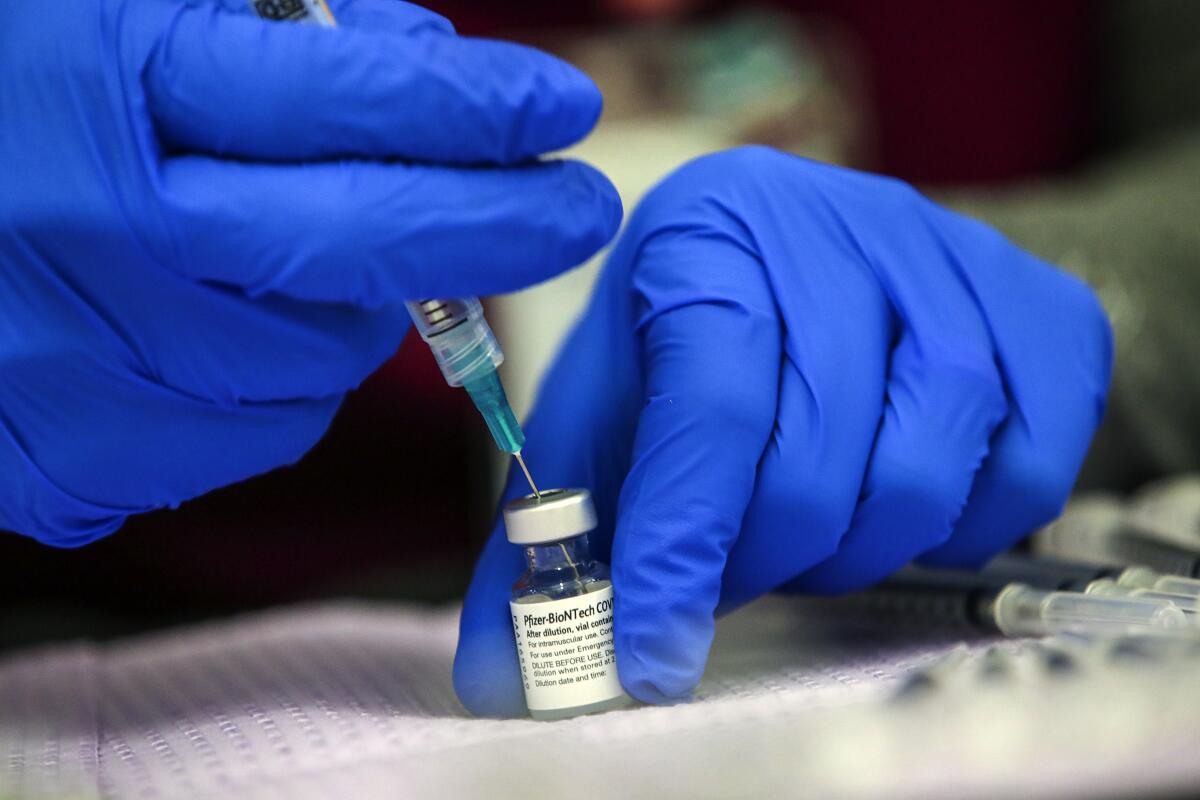
Roosevelt Park in Los Angeles.
- Share via
The formal approval of the Pfizer-BioNTech COVID-19 vaccine could be a key turning point in California’s pandemic response, opening the floodgates to even more mandates and — experts hope — a significant wave of vaccinations.
The state has already established an aggressive pandemic response, with a large number of agencies and institutions having instituted vaccination policies, including inoculation requirements for educators and healthcare workers.
But experts said Monday’s vaccine approval by the Food and Drug Administration could be a game changer that turbocharges the effort.
“This landmark full FDA approval ... is a major certification of the efficacy and safety of the vaccine that should remove any doubt in people who are still vaccine-hesitant,” said Dr. Robert Kim-Farley, medical epidemiologist and infectious diseases expert at the UCLA Fielding School of Public Health.
The announcement Monday is expected to boost public confidence in vaccines and spur institutions both public and private to start mandating vaccination for employees.
While many people — about 25 million in California alone — did not need the FDA’s stamp of approval in order to roll up their sleeves, more than 35% of the state’s population remains unvaccinated, according to The Times’ tracker.
Many of those people cited the vaccine’s emergency use authorization as a reason for not getting the shots.
Experts said Monday’s action probably will quell some of those concerns, leading to increased vaccinations. But the bigger bump could come from stricter policies.
“It will come from mandates,” said Dr. Peter Chin-Hong, a professor of medicine and an infectious diseases specialist at UC San Francisco, noting that some schools, employers and government agencies have already begun introducing such policies. “It will lead to more companies in the private sector and the public sector [mandating vaccines] after this full approval.”
Indeed, some cities and counties have tied vaccine mandates to FDA approval. San Francisco’s 36,000 municipal employees were told they will have 10 weeks to get their shots as soon as the FDA approves at least at one of the vaccines.
Pasadena is already requiring its employees to be vaccinated, but the city had been allowing temporary deferrals for those awaiting FDA approval — now a moot point. Orange County cities including Santa Ana and Irvine have also announced their plans to require vaccinations for all city workers.
Other areas have made even fewer concessions. The Los Angeles City Council last week voted to require the vaccine for all municipal employees, without an option for regular testing.
And the Los Angeles County Board of Supervisors approved an executive order requiring all 110,000 county employees — including those in the Sheriff’s and Fire departments — to be fully vaccinated by Oct. 1.
The city of Los Angeles is also weighing vaccine requirements for indoor restaurants, stores, gyms, bars and other public spaces.
The single-day death toll of 35 is among the higher ones in recent weeks.
The FDA’s approval arrived at a crucial juncture for California and the nation: The highly transmissible Delta variant has crisscrossed the state for months, and concerns about a mask-filled, anxiety-ridden fall are mounting. Los Angeles County last week surpassed 25,000 deaths from COVID-19.
Yet many of the state’s residents remain deeply divided. Parents and consumers are engaged in battles about face mask mandates and vaccine requirements even as children head back to school, while many workplaces and public venues are trying to determine whether and how to welcome people back.
Many opponents claimed that vaccine mandates were a form of government overreach or even discrimination, particularly as more and more places become off-limits to the unvaccinated.
Though the issue has been debated, Michele Goodwin, a chancellor’s professor of law at UC Irvine and the director of the Center for Biotechnology and Global Health Policy, said most vaccination requirements are legally sound — particularly in light of Monday’s authorization.
“Dating back to 1905, the United States Supreme Court has said that local municipalities — meaning government — can impose vaccine requirements on individuals,” she said, noting that the court has upheld other opinions on the topic.
And the private sector has an even stronger leg to stand on when it comes to vaccination policies, Goodwin said, such as when restaurants set dress codes for workers. Those policies are acceptable so long as they do not discriminate against protected classes such as race, gender, disabilities or sexual orientation.
“Employers can set the terms of employment,” she said.
Many health experts believe mask mandates and tougher vaccine requirements will be needed in the coming months to avoid more serious coronavirus surges.
More people will need to be vaccinated in order to protect the most vulnerable, such as children and those who are severely immunocompromised. (The FDA’s approval currently applies to people over the age of 16, and no emergency authorization has yet been granted for those under the age of 12.)
Officials hoped that the FDA’s announcement will send a strong signal about the safety of the vaccine, which had to meet rigorous standards in order to be approved.
“For weeks we have watched cases go up at an alarming pace among individuals who are not vaccinated while the vaccinated are largely protected, especially against severe and long-term illness,” California Department of Public Health Director Tomás Aragón said in a statement Monday.
“If you are not vaccinated, let this be the milestone that gets you there.”
COVID-19 case rates remain much higher among those who have not received the shots than those who are vaccinated, despite some breakthrough infections. As of Aug. 17, less than 1% of the 5.1 million vaccinated people in Los Angeles County had tested positive for COVID-19, officials said. Of those who were fully vaccinated and tested positive, 0.014% were hospitalized and only 0.0013% died.
Meanwhile, ICUs continue to fill up with unvaccinated people who are being sickened and dying from the virus. Hospitalizations in younger unvaccinated adults between the ages of 18 and 49 have increased 226% since July 7, county officials said.
By far, the age group now most likely to get infected with the coronavirus in Los Angeles County is younger adults — those 18 to 49.
The FDA’s approval of Pfizer’s vaccine carries with it other implications, experts said, including the possibility of off-label uses, such as physicians administering additional doses to patients who may not be building strong immune responses.
It also gives Pfizer the green light for direct-to-consumer marketing — and already, the vaccine has been given a brand name: Comirnaty.
But most agreed that the emphasis in the coming weeks will be on further approvals — for other vaccines and additional age groups — and on further mandates.
“Approval by the FDA of Comirnaty today will indeed strengthen the hands of employers and schools to institute mandates for a vaccine that is fully approved, as has been done in different settings for such vaccines as measles,” Kim-Farley said.
“For those employers or schools or universities that were trying to decide about mandates for vaccination of students or workers,” he added, “this also should give them assurance.”
More to Read
Sign up for Essential California
The most important California stories and recommendations in your inbox every morning.
You may occasionally receive promotional content from the Los Angeles Times.
